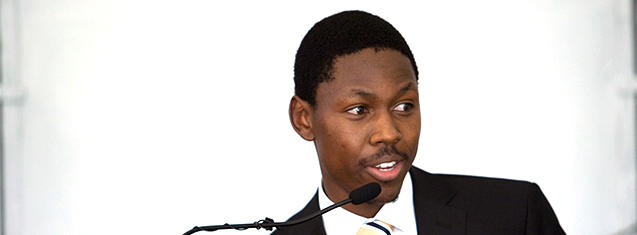UCT scholar in Philosophical Psychology of Black Existence to join Judge Albie Sachs on stage

Dr Buhle Zuma, listed as one of the 2011 Mail & Guardian 200 Young South Africans, is coming to the Bloemfontein Campus. He will share a stage with civil rights activist and former Constitutional Court, Judge Albie Sachs, on Thursday 26 March 2015 in the Albert Wessels Auditorium at 12:30.
Respondent to Judge Sachs
A former Mandela Rhodes scholar, and currently a young lecturer at the University of Cape Town's Psychology Department, Dr Zuma is particularly interested in issues at the heart of our rainbow nation . His research asks the question: What does it mean to be human for black people after centuries of dehumanisation? Dr Zuma also looks at the role of desire and fantasy in the political imagination of post-apartheid South Africa. He describes his developing thought and work as the Philosophical Psychology of Black Existence.
Dr Zuma will act as respondent to Judge Sachs’ public lecture, ‘Sites of memory, sites of conscience’ [Hannes, please link to the article on the main website]. This lecture will form part of a series that focuses on how the creative arts represent trauma and memory – and how these representations may ultimately pave the way to healing historical wounds.
Vice-Chancellor’s Lecture Series on Trauma, Memory, and Representations of the Past
This lecture will launch of the Vice-Chancellor’s Lecture Series on Trauma, Memory, and Representations of the Past. It forms part of a five-year research project led by Prof Pumla Gobodo-Madikizela [], funded by the Mellon Foundation []. The event is hosted by the UFS Trauma, Forgiveness and Reconciliation Studies [].
Dr Zuma lives by the belief that, if he imparts what he learns and knows lovingly and creatively, the world will be the better for it.
Details of the event:
Date: Thursday 26 March 2015
Time: 12:30
Venue: Albert Wessels Auditorium, Bloemfontein Campus
RSVP: Jo-Anne Naidoo at Naidooja@ufs.ac.za